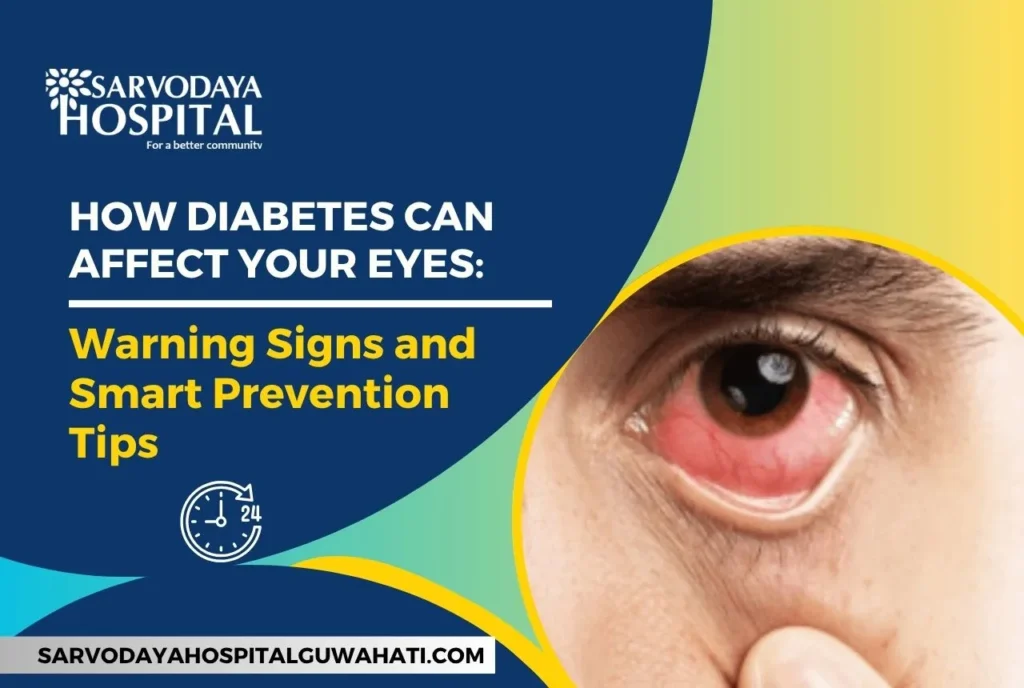Many people are unaware of how diabetes can affect your eyes, making it more than just a blood sugar issue. It is a systemic condition that can quietly damage multiple organs, including the eyes. One of the most overlooked complications is vision loss. Understanding the link between diabetes and eye health is essential for early diagnosis and prevention.
High blood sugar can harm the delicate blood vessels in the eyes, leading to serious conditions like diabetic retinopathy, glaucoma, and cataracts. Often, these issues develop without obvious symptoms, making regular eye check-ups crucial.
In this blog, we’ll break down how diabetes impacts eye health, discuss key warning signs to watch out for, and share practical, science-backed tips to protect your vision and maintain eye health in the long run.
How Does Diabetes Affect the Eyes?
Diabetes can significantly impact eye health by damaging the tiny blood vessels in the retina, the part of the eye responsible for processing light and vision. Persistently high blood sugar levels cause these vessels to swell, leak, or close off completely, leading to poor circulation and inflammation.
This disruption can result in blurry vision, floaters, or even vision loss. If left untreated, the damage may become permanent and lead to blindness. Understanding how diabetes can affect your eyes is essential, as many complications begin silently. Below are the common signs of eye problems caused by diabetes, along with key diabetes-related eye conditions you should be aware of.
- Diabetic Retinopathy
This is one of the most serious complications of diabetes and a leading cause of blindness in adults. It occurs when high blood sugar damages the tiny blood vessels in the retina. In early stages, diabetic retinopathy may not show any symptoms, but as it progresses, it can lead to vision loss.
- Diabetic Macular Edema (DME)
DME is a buildup of fluid in the macula, the central part of the retina responsible for sharp vision. This condition can cause blurry or wavy vision and is a common result of worsening diabetic retinopathy.
- Cataracts
Diabetics are more prone to developing cataracts at a younger age. Cataracts cause the lens of the eye to become cloudy, resulting in blurry vision. Surgery is often needed to restore clear sight.
- Glaucoma
This condition is caused by increased pressure inside the eye that damages the optic nerve. People with diabetes are 40% more likely to develop glaucoma, which typically affects peripheral vision first and may go unnoticed until significant damage has occurred.
Key Signs of Diabetic Eye Problems
Recognizing the signs early can prevent long-term vision loss. Symptoms of diabetic eye disease include:
- Blurred or fluctuating vision.
- Floaters or black spots.
- Difficulty seeing at night.
- Vision that comes and goes.
- Sudden partial or complete vision loss.
- Faded or washed-out colors.
- Eye pain or pressure (especially in glaucoma).

Note: Most diabetic eye problems develop silently, and symptoms often appear only when the damage is already advanced. That’s why understanding how diabetes can affect your eyes and recognizing the risks early is so important for protecting your vision.
Prevention Tips to Protect Your Eyes
Fortunately, with the right steps, you can greatly reduce your risk of eye complications related to diabetes. Here’s how:
- Control Blood Sugar Levels
Maintaining your HbA1c below 7% can help prevent damage to blood vessels in the eyes. Use a glucometer regularly and follow your doctor’s advice on diet, exercise, and medication.
- Monitor Blood Pressure & Cholesterol
High blood pressure and elevated cholesterol levels increase the risk of vision issues. Keep LDL cholesterol and triglycerides within the recommended range to protect your eyes.
- Annual Dilated Eye Exams
Getting a comprehensive eye exam every year allows early detection of changes in the retina and optic nerve, even if your vision seems fine.
- Quit Smoking
Smoking worsens blood vessel damage and significantly raises the risk of diabetic retinopathy and cataracts. Quitting smoking is one of the best things you can do for your eyes and overall health.
- Exercise Regularly
Physical activity boosts circulation and helps regulate blood sugar levels. A simple routine like 30 minutes of brisk walking five days a week can make a difference.
- Eat for Eye Health
Consume foods rich in antioxidants and nutrients beneficial for eye health. Add spinach, carrots, citrus fruits, almonds, and omega-3-rich fish to your meals. Avoid processed sugars and trans fats that contribute to inflammation.

Why Early Detection Matters
Many individuals with diabetes fail to realize how diabetes can affect your eyes and how rapidly eye complications can develop, often without noticeable warning signs. Most diabetic eye diseases such as diabetic retinopathy or glaucoma begin silently and progress gradually, making them difficult to detect without routine eye exams.
By the time symptoms appear, significant and sometimes irreversible damage may already have occurred. That’s why regular, comprehensive eye check-ups are so important. Early detection allows doctors to intervene before serious vision loss sets in, using treatments that can slow disease progression and protect long-term sight.
If you are already experiencing symptoms like blurry vision, floaters, or eye discomfort, it’s important to seek expert care without delay. Dr. Chandrima Das, Best Eye Specialist at Sarvodaya Hospital, Guwahati, offers advanced diagnostics and personalized treatment for diabetic eye conditions to help preserve and protect your vision.
Protecting Your Vision Starts Now
Understanding how diabetes can affect your eyes is key to taking control of your eye health. With the right preventive steps like regular eye exams, managing blood sugar, and maintaining a healthy lifestyle you can significantly lower the risk of serious complications. Even mild symptoms such as occasional blurriness should never be ignored, as they could signal early signs of diabetic eye disease.
Remember, the earlier a problem is detected, the better your chances of preserving vision. Don’t wait for symptoms to worsen, schedule your comprehensive eye exam today and take an active role in protecting your sight.


